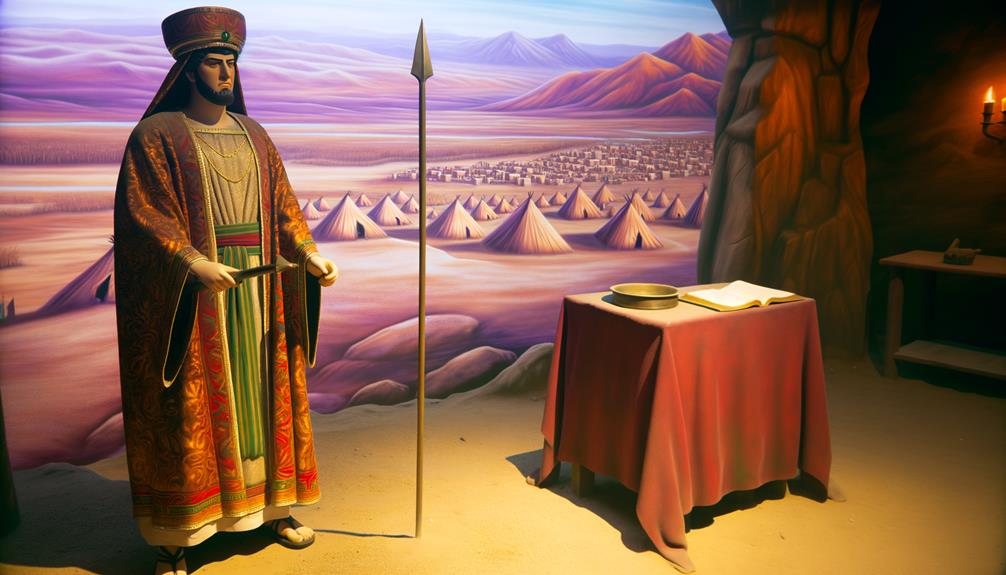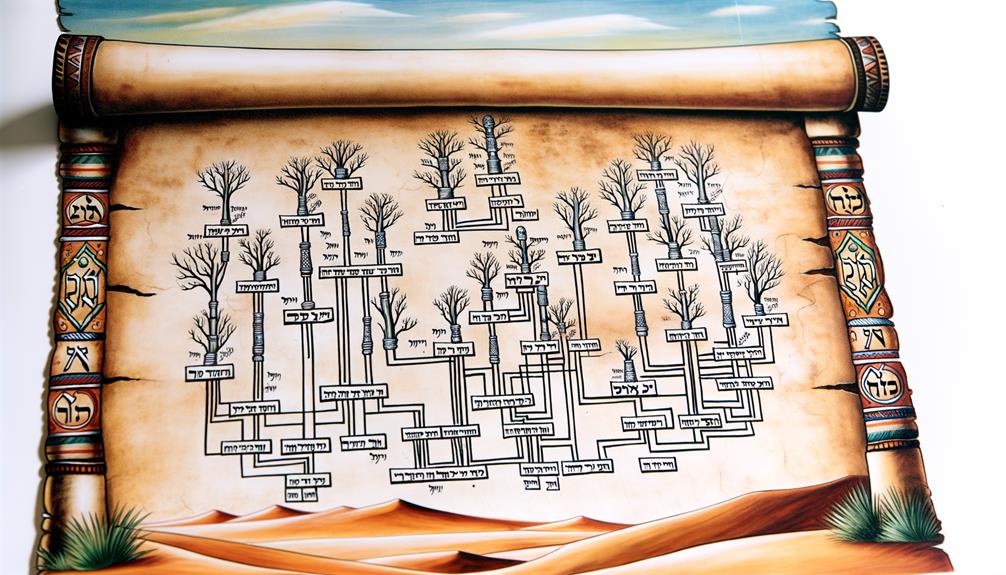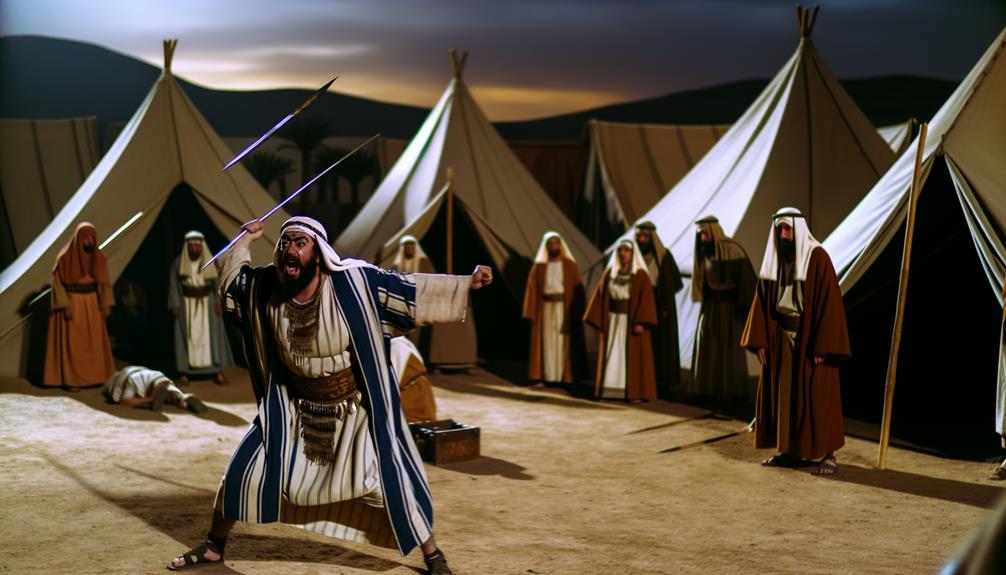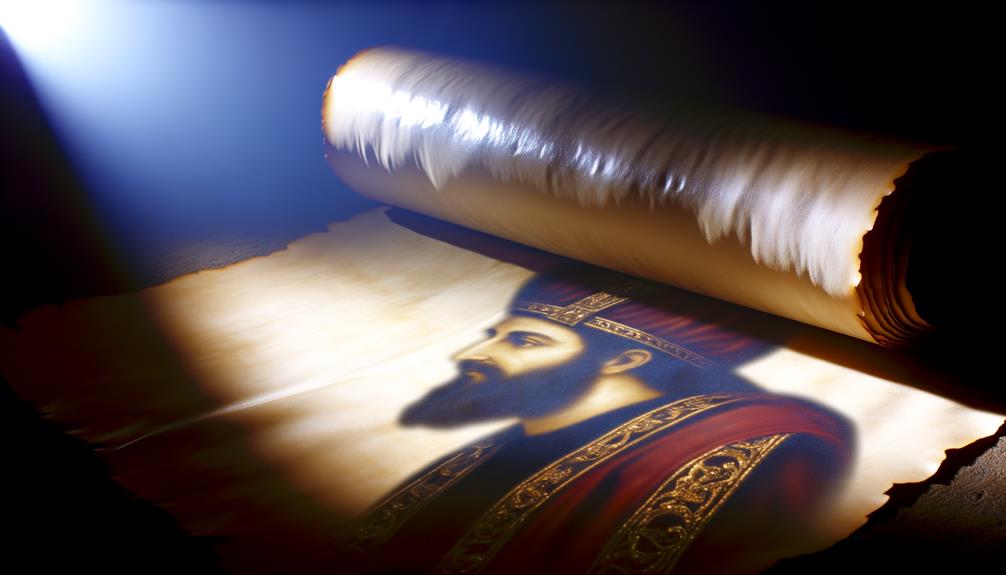Meaning Of Phinehas In The Bible: Zeal and Legacy
Phinehas, a pivotal biblical figure, was the son of Eleazar and grandson of Aaron, firmly situated within the Levitical priesthood. His zealous intervention during the Incident at Peor, where he killed an Israelite man and a Midianite woman to stop a plague, underscores his unwavering commitment to divine commandments and community purity.
This decisive act earned him a divine covenant promising an everlasting priesthood. Phinehas‘s legacy extends beyond his lifetime, symbolizing moral vigilance and fidelity to God.
The continuation of his priestly line reflects his profound impact on Israelite religious and social structures, revealing deeper insights upon further exploration.

Meaning of Phinehas in the Bible: Zeal, Righteousness, and Legacy
| Aspect | Description |
|---|---|
| Name | Phinehas |
| Biblical Reference | Numbers 25, Psalms 106:30-31 |
| Meaning of Name | Dark-skinned, or mouth of brass (Hebrew origin) |
| Role in the Bible | Priest, grandson of Aaron |
| Key Act | Stopped a plague by taking righteous action against sin (Numbers 25:7-8) |
| Divine Reward | Received a covenant of peace and everlasting priesthood |
| Symbolism | Zeal for holiness, divine justice, covenant loyalty |
| Legacy | Remembered as a righteous and courageous servant of God |
Phinehas in Biblical Genealogy

Phinehas, a significant figure in biblical genealogy, is introduced as the son of Eleazar and grandson of Aaron, the first high priest of Israel. This lineage underscores his prominent position within the Levitical priesthood, which was central to Israelite worship and religious structure.
The genealogical record situates Phinehas within a continuum of spiritual leadership, highlighting the hereditary nature of the priestly office. His ancestry not only establishes his legitimacy but also connects him to the foundational moments of Israel’s religious history, particularly the covenantal traditions instituted by Aaron.
This context is essential for understanding Phinehas’s actions and their theological implications within the broader narrative of the Israelites’ journey and their covenant relationship with Yahweh.
The Zeal of Phinehas

Demonstrating fervent dedication to upholding the sanctity of Israelite worship, the actions of Phinehas as recorded in the Bible highlight a pivotal moment of zealous intervention against idolatry and immorality.
Phinehas, grandson of Aaron the High Priest, acted decisively to halt a transgression that threatened the spiritual integrity of the Israelite community. His actions are emblematic of a profound commitment to the covenantal laws and divine commandments.
The zeal of Phinehas underscores the importance of religious purity and the enforcement of sacred ordinances. His fervor not only quelled immediate transgressions but also signified a broader theological assertion of divine justice, serving as a powerful reminder of the consequences of disobedience within the covenantal framework.
The Incident at Peor

The zeal of Phinehas finds its most dramatic expression in the biblical account of the Incident at Peor, where his decisive actions confronted a grave episode of idolatry and immorality among the Israelites.
This episode, recorded in Numbers 25, describes how the Israelites engaged in illicit relations with Moabite women and participated in the worship of Baal of Peor. Such behavior threatened the covenantal relationship between Israel and God.
In response, Phinehas, son of Eleazar and grandson of Aaron, took immediate and drastic measures by killing an Israelite man and a Midianite woman in flagrante delicto.
His intervention was not merely an act of violence but a zealous act to restore sanctity and order, demonstrating his unwavering commitment to divine commandments.
Phinehas and the Plague
In the aftermath of the Incident at Peor, Phinehas’s zealous act played a pivotal role in halting a devastating plague that had begun to ravage the Israelite community.
The Israelites had succumbed to idolatry and immorality with the Moabites, invoking divine wrath in the form of a plague.
Phinehas, witnessing blatant defiance of God’s commandments, took immediate action by executing an Israelite man and a Midianite woman engaged in illicit behavior.
This decisive act of zeal for God’s honor was seen as a turning point, effectively curbing the divine punishment.
Phinehas’s intervention underscores the importance of covenant fidelity and demonstrates how individual actions can influence broader communal outcomes in biblical narratives.
Divine Covenant With Phinehas

The divine covenant with Phinehas, as documented in the Book of Numbers, emanated from his zealous act that halted a devastating plague among the Israelites.
This act of fervent piety resulted in God’s promise of an everlasting priesthood to Phinehas and his descendants.
The covenant’s generational impact consequently underscored a perpetual legacy of spiritual leadership within his lineage.
Zealous Act’s Consequence
Phinehas’s zealous act in Numbers 25 not only halted a devastating plague among the Israelites but also resulted in a divine covenant, establishing a perpetual priesthood for his descendants.
This covenant signified divine approval of Phinehas’s actions as a manifestation of loyalty to God’s commands. The covenant included specific promises and consequences, illustrating the interplay between divine justice and mercy.
| Aspect | Description | Divine Implication |
|---|---|---|
| Action | Phinehas’s intervention | Stopped the plague |
| Covenant | Divine promise of perpetual priesthood | Guaranteed lasting priestly lineage |
| Divine Approval | Phinehas’s zeal for God’s honor | Affirmed by God directly |
| Consequence | End of Israelite suffering | Immediate cessation of plague |
| Legacy | Enduring priestly lineage | Continuation of priesthood through generations |
This act exemplifies how zealous loyalty can lead to divine favor and historical significance.
Everlasting Priesthood Promise
Establishing an everlasting priesthood, the divine covenant with Phinehas underscores the significance of unwavering dedication to divine commandments within the biblical narrative.
This covenant, detailed in Numbers 25:12-13, was granted in response to Phinehas’s zealous act, which halted a plague among the Israelites. By bestowing this perpetual priesthood, God affirmed Phinehas’s righteousness and commitment to upholding sacred laws.
The covenant is not merely a reward but symbolizes a divine endorsement of moral vigilance and piety. In broader theological discourse, this promise functions as a pivotal moment, emphasizing that divine favor is closely tied to human actions that reflect steadfast devotion to God’s will.
This covenant therefore remains a cornerstone in understanding priestly lineage and religious duty in biblical tradition.
Covenant’s Generational Impact
In examining the generational impact of the divine covenant with Phinehas, one observes a profound perpetuation of priestly authority and religious responsibility that extends beyond his immediate lifetime.
This covenant, documented in Numbers 25:12-13, not only established Phinehas’s lineage as perpetual priests but also underscored the enduring nature of divine promises within the Hebrew tradition.
The significance of this covenant transcends a mere familial blessing; it encapsulates a divine endorsement of zeal for righteousness and adherence to divine decrees.
Consequently, Phinehas’s descendants were entrusted with sustaining the spiritual and moral fabric of the Israelite community.
This enduring priestly lineage highlights the theological and sociocultural ramifications of divine covenants, affirming their critical role in shaping biblical history and religious continuity.
Phinehas as High Priest

As a significant figure in Israelite history, Phinehas’s tenure as High Priest not only emphasized his zeal for upholding religious purity but also solidified his legacy within the priestly lineage. His role can be analyzed through several key dimensions:
- Ritual Observance: Phinehas’s strict adherence to ritual laws guaranteed the sanctity of worship practices.
- Judicial Authority: He exercised considerable judicial power, arbitrating disputes and maintaining social order.
- Symbolic Representation: Phinehas embodied the covenant between God and Israel, reinforcing theological continuity.
- Military Leadership: His involvement in military campaigns underscored the intertwining of religious and national identity.
These facets collectively illustrate the thorough nature of his high priesthood, highlighting his multifaceted impact on Israelite society.
Phinehas in Later Texts

Phinehas’s legacy extends beyond his lifetime, as he is referenced in later biblical texts that underscore his enduring influence on Israelite religious and social structures.
Importantly, in Psalm 106:30-31, Phinehas’s zealous act is celebrated as righteous, solidifying his role as a paragon of covenantal faithfulness.
Additionally, his actions are recounted in 1 Chronicles 9:20, affirming his high priestly line‘s legitimacy. The historical narrative in Joshua 22 highlights Phinehas’s role as a mediator, entrusted with resolving potential inter-tribal conflict, thereby maintaining national unity.
These references collectively signify his lasting impact on the communal memory and religious ethos of Israel, illustrating how his deeds were not only pivotal in his time but also exemplary for subsequent generations.
Symbolism of Phinehas’ Actions

The actions of Phinehas, particularly his zealous intervention to stop the Israelite sin at Baal-Peor, carry profound symbolic weight within the biblical narrative.
This episode underscores several key elements:
- Covenantal Fidelity: Phinehas’ actions symbolize a staunch commitment to upholding the covenant between God and Israel, emphasizing the necessity of loyalty.
- Divine Sanction: His zeal is portrayed as aligning with divine will, illustrating the importance of righteous indignation against sin.
- Community Purity: By halting the transgression, Phinehas’ intervention underscores the importance of maintaining communal purity and holiness.
- Intercessory Role: His act of stopping the plague signifies a mediatory role, bridging divine justice and mercy.
These symbolic layers contribute richly to the theological and ethical dimensions of the biblical text.
Lessons From Phinehas’ Zeal

Phinehas’ actions serve as a compelling example of righteous indignation, highlighting the necessity of moral fervor in confronting transgressions.
His immediate intervention underscores the importance of swift action in upholding divine principles. This episode invites reflection on the balance between zeal and justice in religious and ethical contexts.
Righteous Indignation Example
In examining the actions of Phinehas, his display of righteous indignation serves as a profound example of zealous commitment to upholding divine law.
Phinehas’ response to Israel’s transgression demonstrates a key aspect of biblical justice:
- Moral Clarity: Phinehas’ actions underscore the importance of discerning right from wrong amidst communal disobedience.
- Decisive Action: His immediate response reflects the necessity of prompt action in the face of moral crises.
- Divine Approval: The subsequent divine endorsement of his actions highlights the alignment with God’s will.
- Covenantal Blessing: His zeal resulted in a perpetual covenant of peace, illustrating the long-term rewards of righteous indignation.
Phinehas’ example serves as a powerful reminder of the importance of unwavering dedication to divine principles.
Immediate Action Taken
Examining the immediate and decisive actions taken by Phinehas in response to Israel’s transgression provides critical lessons on the embodiment of zealous commitment to divine principles.
Phinehas, upon witnessing an Israelite engaging in idolatrous immorality, acted without hesitation, executing both the Israelite man and the Midianite woman. This act of zeal halted a devastating plague and restored divine favor to Israel (Numbers 25:7-8).
His actions underscore the importance of prompt and resolute intervention when confronted with actions that contravene sacred laws.
Phinehas’ unwavering dedication serves as an exemplar of prioritizing divine commandments over personal or societal complacency, reinforcing the necessity for leaders to uphold moral integrity and enforce righteous standards decisively.
Phinehas’ Legacy in Scripture

The legacy of Phinehas in biblical scripture is significant, as it underscores his role in halting a plague through an act of zealous intervention that earned him a covenant of perpetual priesthood. His actions are emblematic of fidelity to divine commandments and demonstrate the importance of upholding religious purity.
The following points outline Phinehas’ enduring legacy:
- Zealous Leadership: Phinehas’ decisive action against idolatry and immorality serves as a paradigm of zealous leadership.
- Divine Approval: His reward, a covenant of peace, signifies divine approval and lasting priesthood for his descendants.
- Intercession: By stopping the plague, he acted as an effective intercessor for Israel, showcasing the power of righteous intervention.
- Moral Precedent: Phinehas sets a moral and religious precedent for future generations regarding the defense of faith.
Conclusion
Phinehas, a figure enshrined in biblical narrative, embodies the archetype of righteous indignation and divine loyalty. His zealous actions during the incident at Peor, symbolizing an unwavering commitment to covenantal purity, propelled him into a unique covenant with God.
This covenant, serving as an emblem of eternal priesthood, underscores the enduring legacy of divine favor bestowed upon those exhibiting fervent devotion. Phinehas’ legacy, interwoven with themes of zeal and divine approval, remains a profound exemplar within scriptural discourse.






